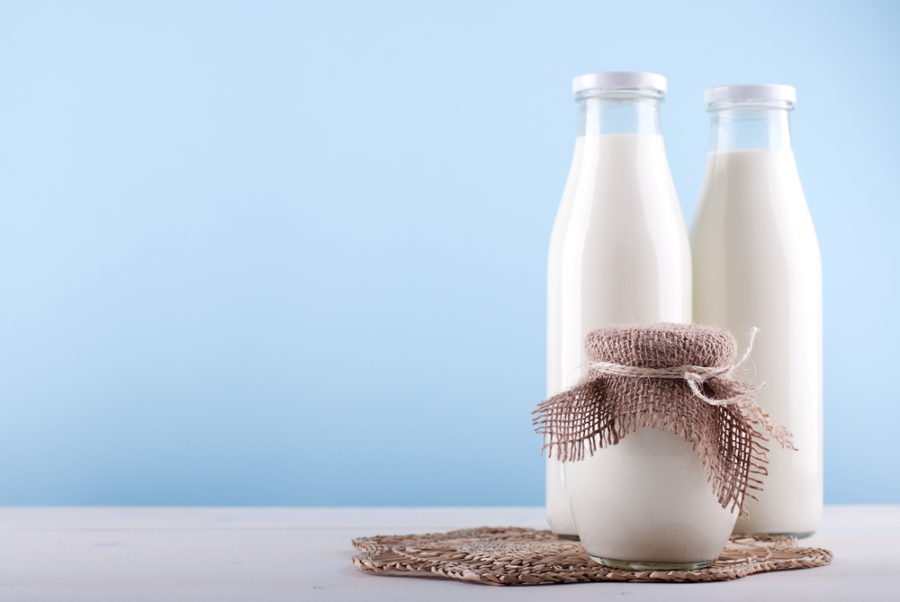Fats and oils aren’t bad for dogs. In fact, some can be exceptionally healthy. Take a look at 6 fats and oils that can enhance your dog’s well-being.
Contrary to popular belief, fat is not bad for your dog. The fact is, we’ve all been fed a lot of false information on the subject of fats in the diet, and old research has been debunked. Fats are actually healthy and important ingredient in both our dogs’ diets, and our own. That said, there are many different kinds of fats and oils so it’s important to learn what’s healthiest. We’ll look in detail at several good fats for dogs.
1. Olive oil
I particularly like cold-pressed extra-virgin olive oil for cooking. Many commonly-used oils break down at high heat, and that can affect digestibility. Olive oil does not, making it the preferred oil to use when cooking for your dog. Rich in antioxidants, especially vitamin E, as well as phytonutrients, olive oil is best stored in the refrigerator to keep it from being degraded by heat and light. It tends to harden during refrigeration, but will liquefy when allowed to warm up to room temperature.
The monounsaturated fats in olive oil actually encourage unwanted pounds to vacate the premises by breaking down the fat inside fat cells. Certain compounds in olive oil are also believed to be effective in preventing cancer. If you simply want to add olive oil to your dog’s meal, use a teaspoon a day for a 30lb to 40lb dog, or up to a tablespoon for a large 90lb dog.
2. Coconut oil
This popular oil has many health benefits – for the skin, immune and digestive systems, and even for bone and brain health. Coconut oil is my favorite for keeping coats gleaming, soft and fresh. It decreases “doggy” odor; even those with a musty scent begin to smell sweet.
Coconut oil is also great to cook with. Coconuts are classified as a “functional food”, and their oil provides many benefits beyond its super-healthy nutritional content. The secret to its healing power is its medium-chain fatty acids, which contain special health-giving properties. The fats in coconut oil are similar to those in mother’s milk, and they have similar healing attributes. Aside from human breast milk, coconut oil is nature’s most abundant source of lauric acid, which has been used to kill viruses, bacteria and yeast as well as prevent tooth decay. It also supports thyroid function and enhances metabolism.
Dogs love coconut oil as a condiment on their food. I recommend organic coconut oil. A half to one teaspoon daily for a medium-sized dog (30lb to 40 lbs) is an average portion.
Both olive and coconut oils are healthy for your dog’s insides, and the great thing is that it will show on his outside. A well-oiled pet will have soft skin and a coat that shines.
3. Pastured/grass-fed/yellow butter
One fat no one seems to mention much is butter. Decades-old research stating that butter is bad for us has been totally debunked. In fact, butter is super-duper healthy – that is, pastured, grass-fed or “yellow” butter is super-duper healthy. Yellow, grass-fed butter has a totally different effect on health than the pale anemic butter we most commonly purchase, and is the only kind I recommend. Kerry Gold Butter from Ireland is a yellow butter made from grass-fed cows.
Cows that eat grass and flowers store in their fat a yellow pigment called beta carotene, which also gets carried over into the milk. This butter is rich in the most easily absorbable form of vitamin A, in addition to being an excellent source of vitamins E, K and D. Yellow butter is also a rich source of cancer-preventing selenium, along with iodine, zinc, copper, manganese and chromium. It contains lauric acid (also found in coconut and mother’s milk), which protects against yeast and fungal infections. In addition, yellow butter contains a compound called Activator X, which helps the body absorb minerals. This makes it great for dental health. Grass-fed butter is also good for thyroid, gut and bone health. Butyric acid, a short-chain saturated fat found in butter, appears to have very promising results on general inflammation, cancer and digestion, according to studies.
Dogs absolutely love butter. You can coat their veggies with it, make an omelet with it, or just give them butter pats for treats. Ghee made from yellow butter is another healthy alternative. I always use a yellow butter pat to give my dogs any supplement in pill form — it molds around the pill and they love the taste.
4. Avocado oil
Almost 70% of avocado oil consists of oleic acid, a monounsaturated Omega-9 fatty acid which is also the main component of olive oil. Extracts from avocado oil have been found to reduce the pain and stiffness caused by osteoarthritis — particularly of the knee — and are also effective against gum disease. Avocado has unique benefits, as its antioxidants are able to penetrate down to the mitochondria and actually improve the function of the cells. Mitochondrial function is a very important keystone for health.
5. Raw fat from meat and poultry
These fats contain vitamin D, another very important component of your dog’s diet. We humans can create vitamin D in our bodies when sunlight reaches our skin, but dogs will only get it from their diets. Studies have shown that 75% of all pets fed a commercial diet are D3 deficient. This doesn’t say much for the form of vitamin D added to these these highly heated and compressed commercial pet foods (cooking animal fat destroys the natural D content).
Dogs fed a raw diet with raw fat are able to get their vitamin D from the fat. In fact, dogs need more fat in their diets than we do because we have the advantage of being able to create our own D3 from sunlight exposure.
6. Raw egg yolks
Raw egg yolks from free-range pastured hens have twice the concentration of Omega-3s as regular eggs, thereby increasing the anti-inflammatory effect dogs can get from the yolks. Raw egg yolks also provide healthy vitamin A, riboflavin, folate, vitamin B12, iron and selenium, making them a nutritious food for dogs.
It’s easy to give your dog a range of fats rather than sticking to one source alone. Each of the above fats has its own benefits, will work to improve your dog’s health, and add extra flavor to his meals.
Editor’s note
Fish oils – quality is key
Oils derived from cold water fish are a rich source of the Omega-3 fatty acids DHA (docosahexaenoic acid) and EPA (eicosapentaenoic acid), and can help support joint and cognitive health along with improving skin and coat condition. Examples of cold water fish used for making Omega-3 supplements include wild salmon, mackerel, anchovies and sardines.
When buying a fish oil for your dog or yourself, it’s vital that you buy high quality supplements and avoid cheap commercial products that could contain contaminants and additives. Do your homework and choose a reputable company that uses solid quality control protocols.
Healthy fat treat for your dog
1 raw egg yolk
1 tablespoon melted organic coconut oil
1 tablespoon room temperature yellow butter
Beat all ingredients together. Feed one-third of this mixture once a day with your dog’s meal. Refrigerate, covered, for no more than three days.







